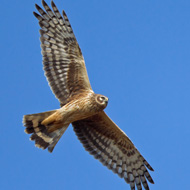RSPB withdraws from hen harrier project

The charity is convinced that the main reason for the hen harrier's scarcity is illegal killing.
The RSPB has withdrawn its support for Defra's Hen Harrier Action Plan, saying its voluntary approach has been unsuccessful. The charity is now calling for grouse shooting estates to be licensed in order to tackle the illegal killing of birds of prey.
Defra's action plan was developed to boost England's population of hen harriers, but last year the RSPB said there were just six successful hen harrier nests from 12 attempts. In a blog post this week, RSPB's conservation director Martin Harper said 2016 is set to be far worse, with only three nests so far.
The charity is convinced that the main reason for the hen harrier's scarcity is illegal killing, associated with land managed intensively for grouse shooting. Early results from the national hen harrier survey suggest the species is doing better away from intensively managed grouse moors in north and west Scotland, Mr Harper added.
There have been a number of incidents in England and Scotland this year, including the disappearance of the hen harriers 'Chance' and 'Highlander' and several suspicious red kite deaths in Yorkshire. Together with recent cases involving pole traps, as well as a 'decoy bird' to attract hen harriers, it's clear that some people are still breaking the law and a different approach is needed to tackle this illegal activity.
The RSPB believes reform can only come from the licensing of grouse shooting, as this would mean shoots could be banned if birds of prey are killed illegally. Mr Harper says the charity will continue to work with partners on the ground, including raptor workers, landowners who wish to cooperate, the public and the police.



 RCVS Knowledge has welcomed Professor Peter Cockcroft as editor-in-chief for Veterinary Evidence.
RCVS Knowledge has welcomed Professor Peter Cockcroft as editor-in-chief for Veterinary Evidence.